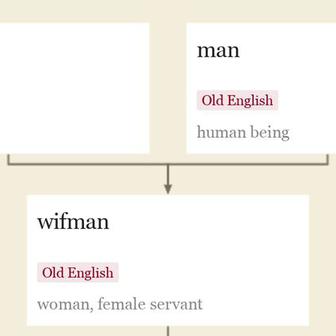Entries linking to chairwoman
"a seat with a back, intended for one person," early 13c., chaere, from Old French chaiere "chair, seat, throne" (12c.; Modern French chaire "pulpit, throne;" the humbler sense having gone since 16c. with the variant form chaise), from Latin cathedra "seat" (see cathedral).
The figurative sense of "seat of office or authority" (c. 1300) originally was in reference to bishops and professors. The meaning "office of a professor" (1816) is extended from the seat from which a professor lectures (mid-15c.). The meaning "seat of a person presiding at meeting" is from 1640s. As short for electric chair from 1900. Chair-rail "strip or board of wood fastened to a wall at such a height as to prevent the plaster from being scraped by the backs of chairs" is from 1822.
"adult female human," late Old English wimman, wiman (plural wimmen), literally "woman-man," alteration of wifman (plural wifmen) "woman, female servant" (8c.), a compound of wif "woman" (see wife) + man "human being" (in Old English used in reference to both sexes; see man (n.)). Compare Dutch vrouwmens "wife," literally "woman-man."
It is notable that it was thought necessary to join wif, a neuter noun, representing a female person, to man, a masc. noun representing either a male or female person, to form a word denoting a female person exclusively. [Century Dictionary]
The formation is peculiar to English and Dutch. Replaced older Old English wif and quean as the word for "female human being," as in Jesus's answer to his mother, in Anglo-Saxon gospels la, wif, hwæt is me and þe? (John ii:4 "Woman, what have I to do with thee?").
The pronunciation of the singular altered in Middle English by the rounding influence of -w-; the plural retains the original vowel. Meaning "wife," now largely restricted to U.S. dialectal use, is attested from mid-15c.
In American English, lady is "In loose and especially polite usage, a woman" [Craigie, "Dictionary of American English"]. This peculiarity was much commented upon by English travelers; in the U.S. the custom was considered especially Southern, but the English didn't bother with nice distinctions and regarded it simply as American. "This noble word [woman], spirit-stirring as it passes over English ears, is in America banished, and 'ladies' and 'females' substituted; the one to English taste mawkish and vulgar; the other indistinctive and gross. The effect is odd." [Harriet Martineau, 1837]
Woman-hater "misogynist" is from c. 1600. Women's work, that considered appropriate to women, is from 1660s. Women's liberation is attested from 1966; women's rights is from 1840, with an isolated example in 1630s.
Trends of chairwoman
More to Explore
updated on October 30, 2017
Dictionary entries near chairwoman
chain-gang
chain-saw
chair
chairman
chairperson
chairwoman
chaise
chakra
chalazion
Chalcedon
chalcedony

